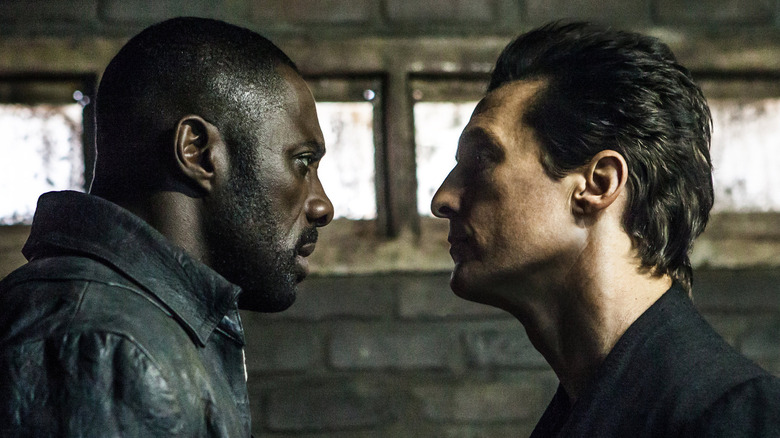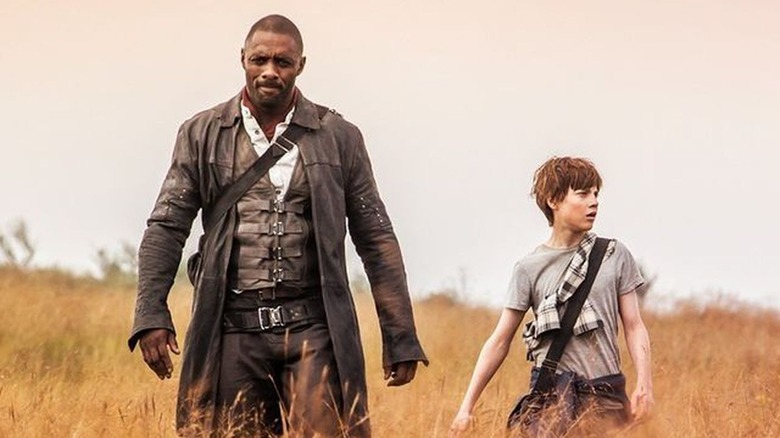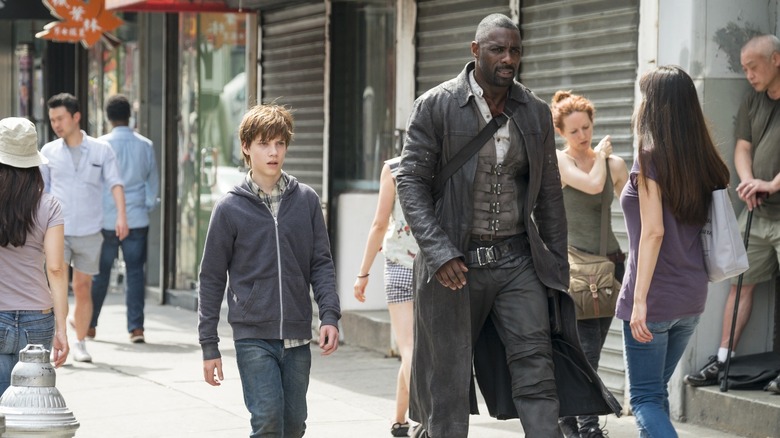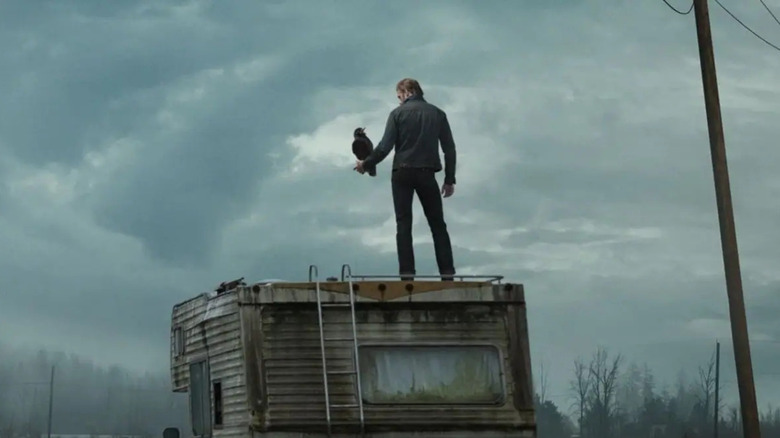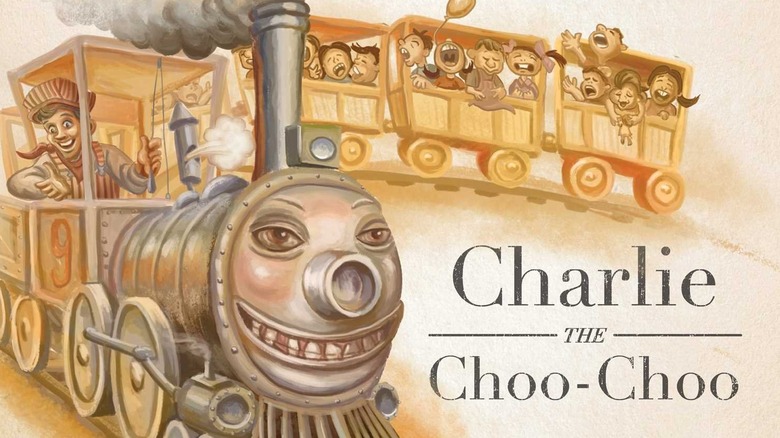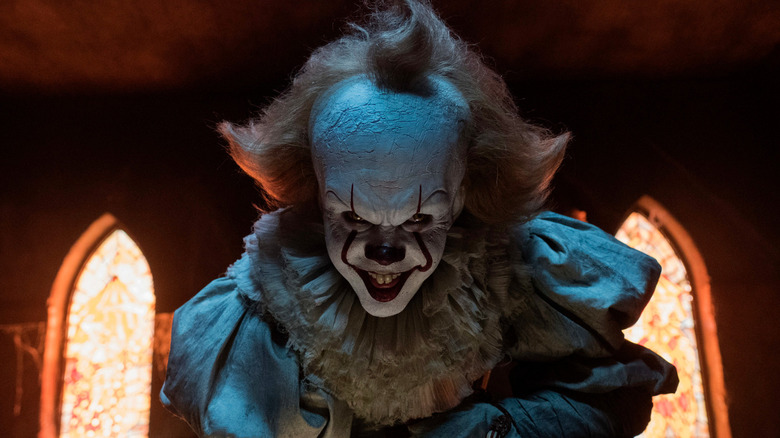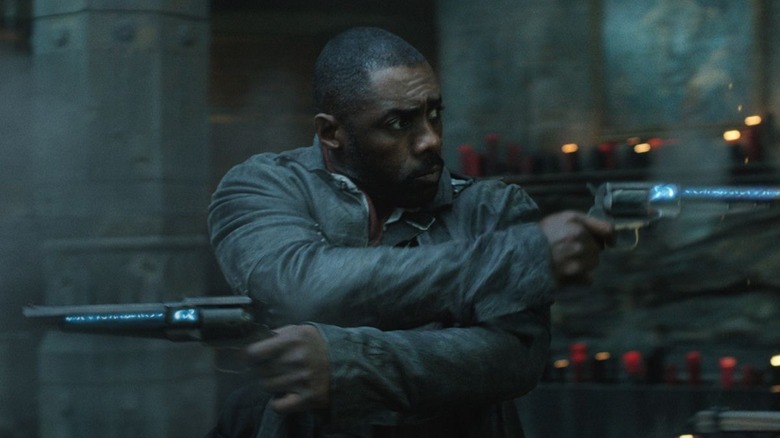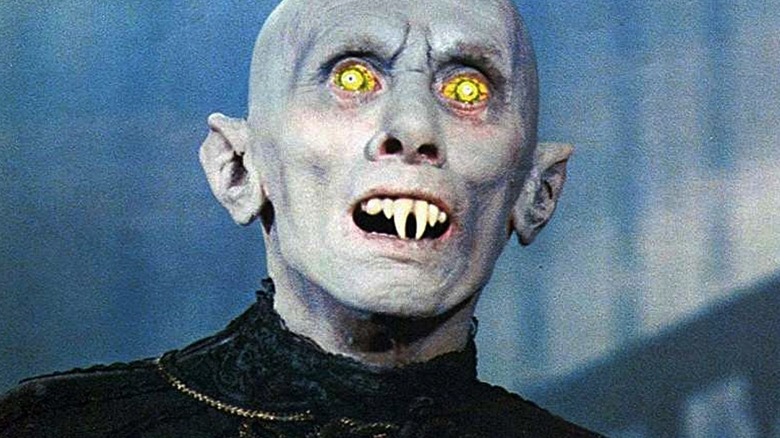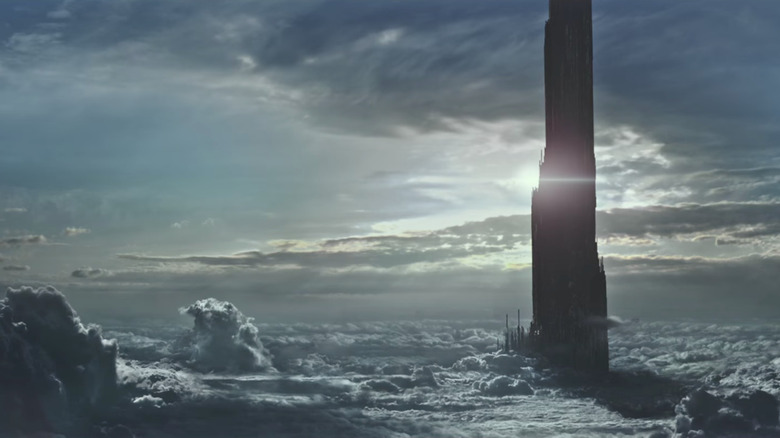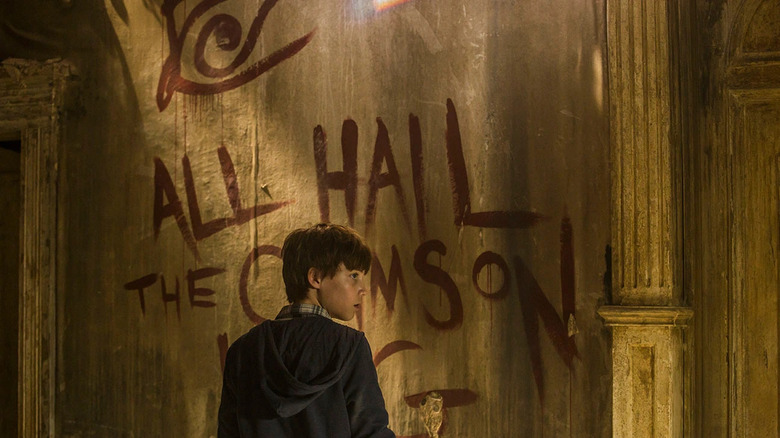The Proper Reading Order For Stephen King's The Dark Tower
We may receive a commission on purchases made from links.
Stephen King's fantasy series "The Dark Tower" is one of the craziest things you'll ever read. Written with no clear plan in mind, this seven-book series spans multiple universes, multiple genres, and multiple timelines, and somehow manages to stay consistently entertaining the whole way through.
The series has yet to become a mainstream hit, however, in part because it's not quite as accessible as some other big fantasy series. Whereas "A Song of Ice and Fire" is self-contained, "The Dark Tower" is a series best enjoyed if you've already read a couple of Stephen King novels first. In fact, the more familiar you are with King, the fuller experience you'll have here. Because even though the main characters' arcs are self-contained throughout the seven (well, eight) books in this series, there are a ton of references to King's other books. As the series continues, the more connected to other King novels the series becomes.
So with that in mind, here's a full, definitive guide on how best to go about reading "The Dark Tower" series. Also, a disclaimer: despite this article being filled with images from the 2017 "Dark Tower" adaptation, please trust me when I say that the movie is not essential viewing material.
The Gunslinger
"The Gunslinger" is the shortest book in the series, and the most atmospheric. It's my second favorite due to just how good of a job King does of establishing Roland as a hardened, lonely traveler who will do anything to reach the titular Dark Tower.
It's not the best book for setting the tone of the series, however: "The Gunslinger" is a low-key story following one character in a world almost entirely disconnected from our own. There's little to ground the reader here, and Roland is something of a cold character in this opening installment. Although this book easily hooked me in, it's common for readers to consider this one of the weakest installments of the series. It's a book that asks a lot from its reader, and you can sort of sense Stephen King wasn't yet fully aware of what kind of story he was telling.
And because King's understanding of this series evolved a lot over the years, I'd suggest making sure you've got the 2003 revised edition of "The Gunslinger," which is a little bit more polished than the original. There's also some more foreshadowing thrown in, and overall it helps the book fit more neatly into the rest of the series.
However, the original 1982 copy is still great. It'll make the transition into the rest of the series a little more jarring, but there's something fun about getting to see the full shift within the next two books as the series becomes increasingly sure of itself. Reading the 1982 copy is a little like watching the pilot episode of a beloved sitcom, where the show hasn't really found its voice yet but you can still see the spark of what would make it great.
The Drawing of the Three
My personal favorite of the series, this is the book where "The Dark Tower" series becomes "The Dark Tower" series. It centers around lone-wolf Roland being forced to acquire a team of companions (a ka-tet) that'll stick with him throughout the whole journey. With Roland in the most desperate situation we've ever seen him in (so far), he's forced to jump into the New York City of our world at various points — 1987, 1964, 1977 — and the culture shock Roland experiences as he does so is one of the most entertaining aspects of the whole series.
Not only is this an absolute page-turner, but it's the book that really sets the tone for the rest of these books. If you didn't like "The Gunslinger," don't give up until you've at least tried this one out. Here, the scope of the series widens dramatically, and the moment the new major characters are introduced you'll wonder how the series could've ever existed without them.
It's also the book that really starts the trend of referencing other Stephen King stories. Here, a character describes something he's seeing by comparing it to Kubrick's adaptation of "The Shining." It's a moment that makes you think: wait, is King allowed to do that? Can a character reference a movie that only exists because of a book written by the author who's writing said character? Turns out: yes, King is allowed to do stuff like this, and it's only going to get crazier from there.
Bonus Material: The Stand & The Eyes of the Dragon
Although "The Dark Tower" series as a whole mostly stands on its own, it certainly helps if you're familiar with other King works. Going into book 3, the King novel that will most enhance your experience is "The Stand." This massive, not-timely-at-all story about a pandemic that gets out of hand is not only one of Stephen King's most famous and well-regarded works, but it serves to introduce the character Randall Flagg. Flagg is basically the devil, and he pops up in some form or another in plenty of King's other books. You've already kind of seen him in "The Gunslinger," but it's best to go into "Wizard and Glass" with the deeper understanding of his character that "The Stand" brings.
Randall Flagg also plays a role in "The Eyes of the Dragon," a short family-friendly fantasy novel that, like "The Stand," shines some light on this unique character. And although Roland Deschain is never mentioned, the village the book takes place in exists in Roland's world. This is a much shorter novel than "The Stand," so it wouldn't be a crime if you chose to just read this book and save the 1,000+ page epic for a later date. (Just promise you'll at least read "The Stand" before "Wizard and Glass," alright?)
The Wastelands
Often considered the best book in the series, this is Stephen King at his creative height. This book's got everything: talking trains, horny demons, robot bears, very interesting poetry. This is the first book where Roland's ka-tet is fully formed, and it's probably the book King fans think about first when they look back at the series. It's a book that fully embraces the weird sci-fi and fantasy concepts, the one where King's complete disinterest in sticking to any one genre is made most clear.
This book also has a fun little tie-in book called "Charlie the Choo-Choo," written under the pseudonym Beryl Evans. There's not a ton of substance to the book (it's formatted like a children's book, after all) but it's a fun bit of worldbuilding. It's essentially the real-life edition of a creepy book a character picks up in the first half of the novel, and its relevance to the story should become clear as you make your way through "The Wastelands."
"The Wastelands" ends with a massive cliffhanger, which frustrated fans at the time. Rubbing more salt in the wound was how King took six years before getting around to writing the sequel that resolved the cliffhanger. You may be tempted to jump straight into book four to see how things shake out, but before you do...
Bonus material: It
Much like "The Stand," "It" is widely considered essential reading for any true Stephen King fan. Although there are no major direct references to "The Dark Tower" series, there are a ton of thematic and worldbuilding similarities. Although the group of friends the book is based on doesn't call themselves a ka-tet like Roland's group does, that is essentially what they are. The villain of "It" also shares some interesting similarities to a few "Dark Tower" villains who'll pop up a little down the line.
Some other books you might want to consider reading (but aren't as necessary) are "The Talisman" and "Black House," two connected books King co-wrote with Peter Straub. They aren't essential to understanding anything in "The Dark Tower" series, but they'll help to make the later books a more rewarding experience.
I understand you probably want to dive straight into book 4 to get a resolution to that book 3 cliffhanger, but think of this delay as you paying respect to the millions of '90s King fans who had to wait six years for closure.
Wizard and Glass
This is one of the most divisive books in the series because it dedicates most of its pages to a flashback to Roland's teen years. Readers at the time were frustrated because they waited six years only to get a book where the main plot barely moved forward, and then they had to wait another six years for book 5. Despite that, the actual story being told in the flashback is great and helps to prove Roland as one of the most complex, compelling protagonists King's ever written.
This book also ends on a fairly peaceful note. The characters are still on their quest for the Dark Tower and there are plenty of hard roads ahead for them, but they aren't in any immediate peril as "Wizard and Glass" dials down. Books 5 through 7 were written in quick succession by Stephen King, so I won't be recommending any extra reading material once we get to them. This makes the break here, between books 4 and 5, a natural place to put the series on hold and really dive into that extra King stories.
If you still haven't read "The Talisman" or "Black House," now would also be a good time to try those out. But that's not all.
Bonus Material: Salem's Lot, Insomnia, The Little Sisters of Eluria, Hearts in Atlantis
"Salem's Lot" is the most important of the titles mentioned in this section, as a certain character from the book is going to have a prominent role in book 5. (It's also got vampires, so win-win.) The things you learn in "Insomnia," meanwhile, are going to come in clutch when you're reading book 7.
"The Little Sister of Eluria" is a novella written in 1998, most easily found in King's collection "Everything Eventual." It's another flashback story, but its events take place after the big flashback of "Wizard and Glass." You don't technically need to read this book to understand everything afterward, but it certainly helps. And while you've got the collection in your hands, you should also read the titular story "Everything Eventual" in the collection as well, because that also features connections to the Dark Tower universe.
One of the characters in "Hearts of Atlantis," published by King in 1999, will also turn out to be important down the line.
Some other books I'd strongly recommend reading at this point (that aren't quite as vital) are "Desperation" and "The Regulators." These are twin novels that were published simultaneously, the former under King's name and the latter under King's pseudonym, Richard Bachman. These books have minor connections to the main series. Also, King's interest in twins is going to be very important as we enter book 5.
Wolves of the Calla, Song of Susannah, The Dark Tower
More so than any of the first four, these final three books tend to blend together a little. In particular, "Song of Susannah" and "The Dark Tower" often feel like one giant book split in two. That's why I don't recommend any more breaks in between. After the big flashback of book 4, you're likely anxious to dive back into the main plot, and that's exactly what these books do. "Wolves of the Calla" spends its pages building back up the momentum established before "Wizard and Glass," and by the time you reach Calla's final chapter, the series is charging full speed ahead.
The final two books contain some of the boldest writing choices any mainstream author has ever made, and I can't guarantee you'll like them all. There's a particular decision in book 6 that's often described as the series jumping the shark, but which I'd describe as the thing that elevates this series into a full-on masterpiece. Your mileage may vary.
My only big piece of advice is to be wary of the idea that there was some sort of quality dip in these final three. You see, it was after book 4 that Stephen King was nearly killed after a car ran him over, and this was part of what inspired him to jump back into the series and finish it with surprising speed. Because he wrote these last three installments so quickly, that led to worries that the final books would be rushed, and I genuinely think this expectation affected the way the final three books were initially perceived. But as time goes by and cooler heads have prevailed, people seem to have grown kinder to "The Dark Tower's" conclusion.
The Wind Through the Keyhole
But was "The Dark Tower" the conclusion? Because in 2012, King wrote an eighth installment of the series, "The Wind Through the Keyhole." Despite being written last, this book takes place during the time skip between "Wizards and Glass" and "Wolves of the Calla." It's a light and breezy novel, designed to let us hang out with these characters one last time, even though we know where their stories lead.
In the initial draft of this article, I suggested reading this before "Wolves of the Calla." My reasoning was that the book helped make the time jump feel a little less jarring on the first read, and it gives the reader some extra time to just hang out with the characters before book 5 starts sprinting towards the end of everyone's character arcs.
But in the end, I figure your best choice is to finish the seventh book first and sit with that ending for a while. Then, whenever you find yourself missing Roland's ka-tet, you can pick up this novel for a fun, nostalgic, small-scale adventure. It's perfect beach-read material, one that works so well precisely because we know exactly what happens to these characters from here. Neither option is wrong, however, as reading it first won't spoil the final three books.
This list may make reading this series sound like an exhausting task, but trust me: it isn't. Each additional King novel won't feel like a homework assignment, but like another entertaining, self-contained story that also contributes to a larger narrative. Although you don't have to read these other books to enjoy the series, it's only with those in mind that you can fully appreciate how much of a mad genius Stephen King really is.
